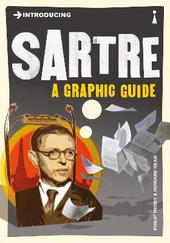
|
Introducing Sartre: A Graphic Guide
Paperback / softback
Main Details
| Title |
Introducing Sartre: A Graphic Guide
|
| Authors and Contributors |
By (author) Philip Thody
|
|
Illustrated by Howard Read
|
| Series | Graphic Guides |
|---|
| Physical Properties |
| Format:Paperback / softback | | Pages:176 | | Dimensions(mm): Height 168,Width 118 |
|
| Category/Genre | Western philosophy from c 1900 to now |
|---|
| ISBN/Barcode |
9781848312111
|
| Classifications | Dewey:194 |
|---|
| Audience | |
|---|
| Illustrations |
Illustrations, unspecified
|
|
Publishing Details |
| Publisher |
Icon Books
|
| Imprint |
Icon Books
|
| Publication Date |
3 February 2011 |
| Publication Country |
United Kingdom
|
Description
Jean-Paul Sartre was once described as being, next to Charles de Gaulle, the most famous Frenchman of the 20th century. Between the end of the Second World War in 1945 and his death in 1980, Sartre was certainly the most famous French writer, as well as one of the best-known living philosophers. Sartre: A Graphic Guide explains the basic ideas that inspired his world view, and pays particular attention to his idea of freedom. It also places his thinking on literature in the context of the 20th century debate on its nature and function. It examines his ideas on Marxism, his enthusiasm for the student rebellion of 1968, and his support for movements of national liberation in the Third World. The book also provides a succinct account of his life, especially the impact of his unusual childhood on his attitude towards French society. This series of graphic guides covers every key thinker and topic in philosophy, psychology, science, politics, religion, cultural studies, linguistics and more. Written by experts and illustrated by leading graphic artists, there is no better way to acquaint yourself with the biggest and best ideas humanity has ever come up with.
Author Biography
Philip Thody was Professor of French Literature at the University of Leeds until 1993. He died in 1999. Howard Read has illustrated numerous Introducing titles including Heidegger and Evolution
|